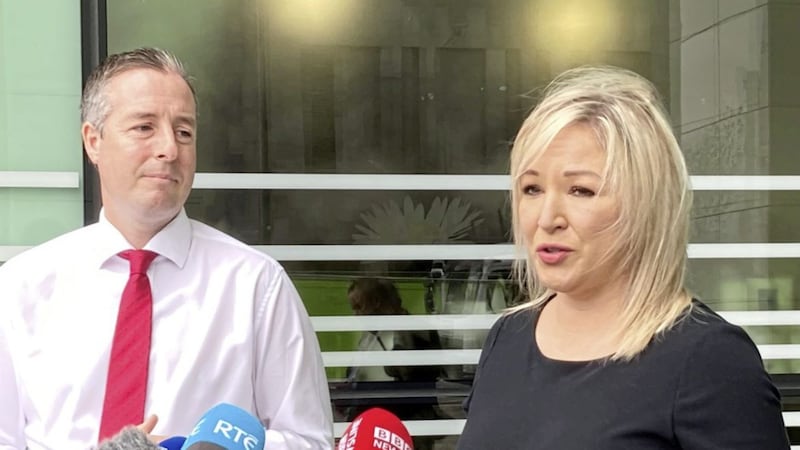When it comes to fine words as a preface to government inaction on climate change, you will hardly be surprised to learn that Stormont is up there with the best of them.
Before Paul Givan and Michelle O’Neill flew to the Glasgow conference, they warned of “catastrophic” climate change and how failing to act would be “a dereliction of duty”. Despite their words, they represent the only region in these islands without climate change legislation or even a sense of remedial action.
Welcome to the world of political posturing.
Stormont’s failure to act on climate change can be seen in both rural and urban settings. A major problem in farming is that cattle are a significant source of methane, which causes global warming. But altering modern agriculture will totally change rural communities.
Will SF and the DUP stand at their local cattle marts, telling beef farmers they must change their way of life? No, but their ministers will offer fine words for the television cameras.
Reducing emissions will mean fewer cattle, fewer jobs and reduced meat exports from here. That will require us to eat less beef (and more vegetables) as we did in the 1950s.
So who in Stormont will tell us what to eat with an election looming? (We could return to the traditional diet of home-grown potatoes were it not for the protocol preventing seed potato imports from Britain. Joined up government, how are you?)
Instead of applying solutions, Stormont funds the problem. Ammonia is an air pollutant, produced mainly by cattle, which damages biodiversity and human health. We generate 12 per cent of UK ammonia even though we only have 3 per cent of the population. It results mainly from animal urine and manure mixing in slurry tanks.
But Stormont offers grants for building cattle sheds, most of which include underfloor slurry tanks. Keeping cattle outdoors would help to solve the problem. However, Stormont penalises farmers for not maintaining their fields in good environmental and agricultural condition when cattle churn up the wet ground. (Cows are expected to stay off the grass.)
In energy supply, gas prices here are spiralling. Stormont could have already promoted a scheme to use offshore wind farm energy for producing green hydrogen from water (a simple process).
Green hydrogen (a clean fuel) could then be pumped through the existing pipelines in place of the current gas, which releases methane, carbon monoxide and nitrous oxide.
Most existing gas boilers could use hydrogen by changing three component parts, costing about £100 and installed in about an hour. This same gas could also be used to fuel hydrogen cars.
If you think that is a bit far fetched, Wrightbus in Ballymena have produced the world’s first hydrogen-powered double decker. We have the technology, but we lack political leadership.
Hydrogen production and supply could be outsourced to a specially created semi-state body (like Bord na Móna in the south) giving Stormont control over gas prices and clean energy. Instead, it acts not as a government, but as an agency for private companies in the energy sector.
Although we have no climate change legislation, we have two competing bills in Stormont. The executive bill harks back to the 1960s trend of prioritising agriculture, with Edwin Poots saying the Green Party must take their boot off the necks of the rural community.
In Bangladesh an estimated 53 million people may have to move (no one knows where to) because of rising sea levels. Whose boot is on whose neck? The Greens’ bill needs more detail to strengthen it, but it is significantly more ambitious than the executive’s.
There is ample evidence that the Stormont Executive fails to understand the necessary solutions. Even if they did, they do not have the political will to implement them. They are good at bickering about the border, but not much else.
So as 18 year old climate activist Greta Thunberg might point out, when it comes to climate change, Ulster says blah, blah, blah.……








